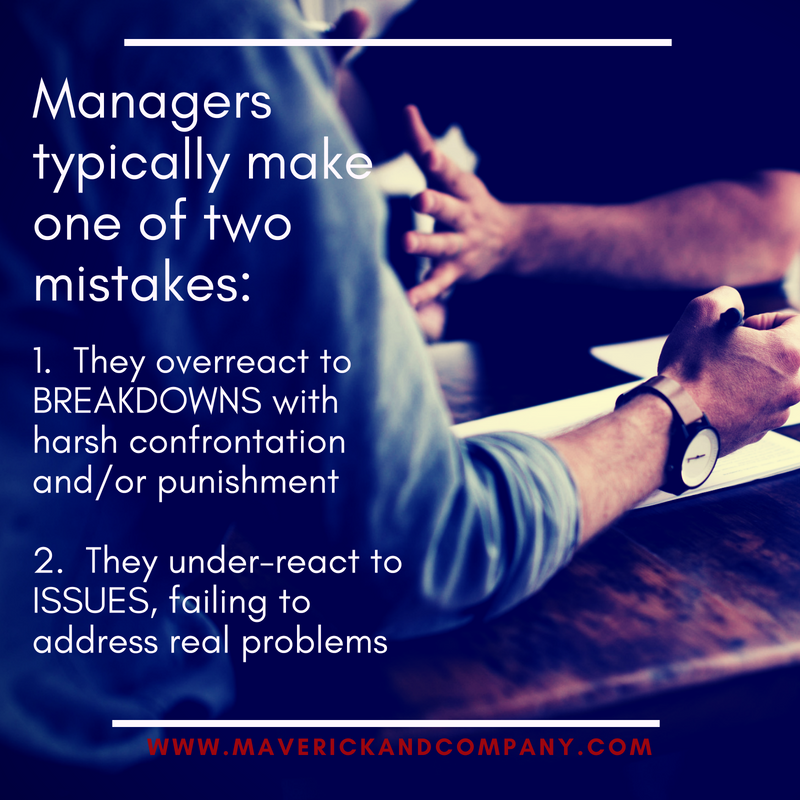MANAGEMENT HOW TO: Accountability, Breakdowns & Issues
There are a lot of reason people don't confront employees.
It is socially awkward.
You might make them sad.
They might get angry.
What if you’re wrong?
What are you supposed to say?
Another, less obvious reason is that it’s sometimes hard to know what you should just let slide.
ATTITUDE, EFFORT, & RESULTS
My general rule for management is that a team member SHOULD be giving three things: Attitude, Effort, and Results. Occasionally, they might falter in an area, have a bad week, or just blow it in one of those categories. In those cases they should still, at minimum, be giving me two of the three.
A sales person might be going through a divorce and be a little grumpy in meetings. As long as their effort and results are still good, a TEMPORARY bad attitude might be o.k.
It’s not useful for a manager to jump on every little thing every single time. You work with humans. You need to leave room for their humanity.
But ignoring real problems has a corrosive and contagious effect that can quickly turn toxic.
So how do you know what to confront and what to let slide?
BREAKDOWNS & ISSUES
There are two different types of problems that occur in organizations.
BREAKDOWNS are temporary problems, usually caused by unusual circumstances. Ex: Someone is late to a meeting because of a flat tire.
ISSUES are major violations (sexual harassment, stealing, drug abuse) or patterns of behavior. Ex: Someone is frequently late to meetings.
Managers typically make one of two mistakes:
They overreact to BREAKDOWNS with harsh confrontation and/or punishment
They under-react to ISSUES, failing to address real problems
This is why the first level of confrontation I teach managers is to be CURIOUS.
When something goes wrong, your first job is to figure out if you’re dealing with a BREAKDOWN or an ISSUE.
So you’re CURIOUS when the person is late, not angry.
You ASK what happened. Instead of yelling at them.
You’re trying to figure out if the problem was a one-time incident, a temporary thing, a circumstantial problem, an anomaly...a BREAKDOWN
OR
if it’s an ongoing pattern of behavior, a consistent problem, a regular occurrence...an ISSUE.
BREAKDOWNS should get a hall-pass.
ISSUES need to be dealt with.
BOTH get addressed.
It’s reasonable to end both conversations with a reaffirmation of what the expectation is and to ask for a commitment from them.
For a BREAKDOWN:
“Hey Joe I understand you had a flat tire. Not the end of the world. In the future, if you know you’re going to be late, please call ahead and let the team know. Breakdowns happen. It’s just important we be able to count on people to be on-time and to communicate when they can’t. Can I definitely count on you for that?”
For an ISSUE*:
“Hey Joe I know sometimes it’s hard to juggle everything AND you seem to have a habit of being a few minutes late. That doesn’t work. It means everyone has to wait for you which is both frustrating and a waste of their time. I know you’ve got a lot on your plate but we need everyone to be on time to meetings and to communicate when they can’t. Can I count on you to be prepared and to get yourself to meetings a few minutes early so we can start at the designated time?”
*This is how you might address something small THE FIRST TIME. If you have to address an issue again, you’d escalate both the tone and content of the conversation. My technique is to be Curious the first time. The second time I am Confused. If a third conversation is required I am Concerned. At each step the tone is cooler and more formal. By the time we get to the third conversation we are talking about real consequences. Solid team members rarely require more than one conversation about an issue.
Great managers are great, in part, because they are reasonable. They aren’t over or under-reacting.
You don’t have to get angry. You don’t have to rant or rave. You DON’T HAVE TO PUNISH people with your tone or consequences.
If you are professional and respectful and appropriate to the circumstance in front of you, you’ll find that people tend to thrive when someone provides real accountability.
When managers ignore real ISSUES, people notice. More things slide. Frustration and resentment build. Your organization looks a little less professional and a little more Lord of the Flies.
Be smarter. Don’t go crazy over a breakdown. But don't skip over problems. And DON'T ignore real ISSUES. Your job as a manager is to DEAL with them.
Want more on confrontation & healthy accountability?
Check out pages 25 & 26 in Section 2 which is full of specific, practical management strategies. (The whole paper is technically awesome. But if you're not a reader or just want to get straight to the management stuff...)
Get the free, no-sign-up-just-give-me-the-damn-article-download HERE.
FRUSTRATED WITH BAD PEOPLE?
Sometimes it IS them. But a lot of people problems are actually management failures. Learn how to tell the difference HERE.
Alecia Huck is the founder of MAVERICK & Company, a management consultant, sought-after speaker and author. She helps frustrated owners build strong leadership teams and processes so they can spend less time fighting fires and more time building what matters. Follow her on LinkedIn for short videos, smart articles and more.
Contact Alecia directly at alecia@maverickandcompany.com






